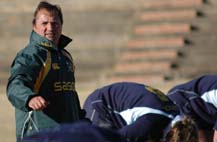Latest News Archive
Please select Category, Year, and then Month to display items
10 March 2022
|
Story Anthony Mthembu
|
Photo Unsplash
 The No Student Hungry team gearing up to start distributing food parcels to the selected students.
The No Student Hungry team gearing up to start distributing food parcels to the selected students.
The UFS is one of the many institutions of higher learning where food insecurity is an active issue. However, the
No Student Hungry Programme is one of the initiatives launched at the university to assist in fighting food insecurity at the institution.
The purpose of the programme
Since its inception in 2011, the initiative has assisted many students in acquiring a healthy meal. Additionally, the Food Environment Office also hands out food packages, so that students can continue to achieve academically. “We are trying to develop a healthy environment for students and make it easier for them to have a nice and healthy meal,” stated Annelize Visagie, who heads the Food Environment Office at the UFS. The Food Environment programme is spread out on all three campuses, each with its own facilitators. Furthermore, the programme mainly caters for students who are not funded by the National Student Financial Aid Scheme (NSFAS) but who are excelling academically. The abovementioned students apply for assistance online, and a list is then drawn up of students who receive assistance for the year.
Alternative solutions to keep the initiative running
On the Bloemfontein Campus, the No Student Hungry Programme will be catering for 200 students in the 2022 academic year, assisting them with a daily nutritious meal. Additional food parcels are also handed out to provide further assistance. “We give food parcels to the students on the list every Tuesday and Thursday at the Thakaneng Bridge,” Visagie highlighted. However, she argues that catering for the student population through this programme can be a challenge, as the demand for assistance is growing rapidly and the ability to assist is limited. The programme relies on partnerships and sponsors to assist the student body. In fact, the coordinators of the programme currently have a memorandum of understanding with Tiger Brands according to which they deliver around 100 food parcels for distribution.
In addition, the coordinators have put in place alternative measures to ensure that they can provide more food to students. “The
Kovsie Act Office, in partnership with the
Department of Sustainable Food Systems and Development, has started a food garden where healthy and nutritious produce are grown, in order to add value to the distribution,” she indicated. Although the programme can only assist to a point, students who are in desperate need of assistance are never turned away. In fact, the
Social Support Unit at Thakaneng Bridge usually assists students with food vouchers for a maximum of four days.
A commitment to teaching healthy eating habits
The programme is not only committed to curbing food insecurity, but also to ensuring that students have a healthy and balanced diet. As such, a booklet is being issued by the
Department of Nutrition and Dietetics in collaboration with the Department of Sustainable Food Systems and Development, which contains ways in which students can make a healthy meal using some of the ingredients offered in the food parcels.
“We want to teach students how to eat healthy in the cheapest way, because they don’t have a lot of money to buy expensive food products,” Visagie argued.
Three more Kovsie staff members involved in Olympic Games
2012-05-30
 |
|
Dr Derik Coetzee
Photo: Supplied
30 May 2012
|
The South African men’s hockey team will practice on our Bloemfontein Campus from 28 May to 8 June 2012, and the team count on the assistance of three Kovsies to prepare them for the Olympic Games taking place in London later this year.
Dr Derik Coetzee, senior lecturer in the Department of Exercise and Sport Science and Head of our High Performance Centre, has been appointed conditioning coach of the team. He will be assisted by Colleen Jones and Riaan Schoeman, also from this department.
The UFS team and Mr Gregg Clark, the team’s coach, will work out a periodisation programme for the team, which will continue until the hockey finals at the Olympic Games. The programme includes the correct exercises, volume, intensity and number of exercise sessions per week.
This is not the first time that Dr Coetzee has assisted sports teams to prepare for important events. In 2007, he was the conditioning coach of the Springbok rugby team that won the World Cup in France. He was also the conditioning coach of the under-21 Springbok team in 2002 that won the Junior World Cup Tournament.
Dr Coetzee says it is a challenge to ensure that the team performs well at the Olympic Games. “The joy on the faces of the coach and players when they qualified in Japan cannot be described because many people thought they would not qualify.”
With the addition of Dr Coetzee, Ms Jones and Mr Schoeman, a total of six staff members from the UFS will be involved with the Olympic Games and the Paralympic Games. The other three are:
- Dr Louis Holtzhausen, Head of the university’s Department of Sports and Exercise Medicine, has been selected as team doctor for the more than 300 athletes that will represent South Africa at this year’s Olympic Games (in London).
- Ms Ebeth Grobbelaar, Assistant Director of the South African Testing Laboratory for Prohibited Substances at the UFS, was invited to be involved in the Drugs Control Centre in the unit against prohibited substances which will test sportsmen and -women during the games.
- Ms Hetsie Veitch, Head of the Unit for Students with Disabilities, has been invited to be a member of the Classification Panel at the final USA Paralympic athletics trials.